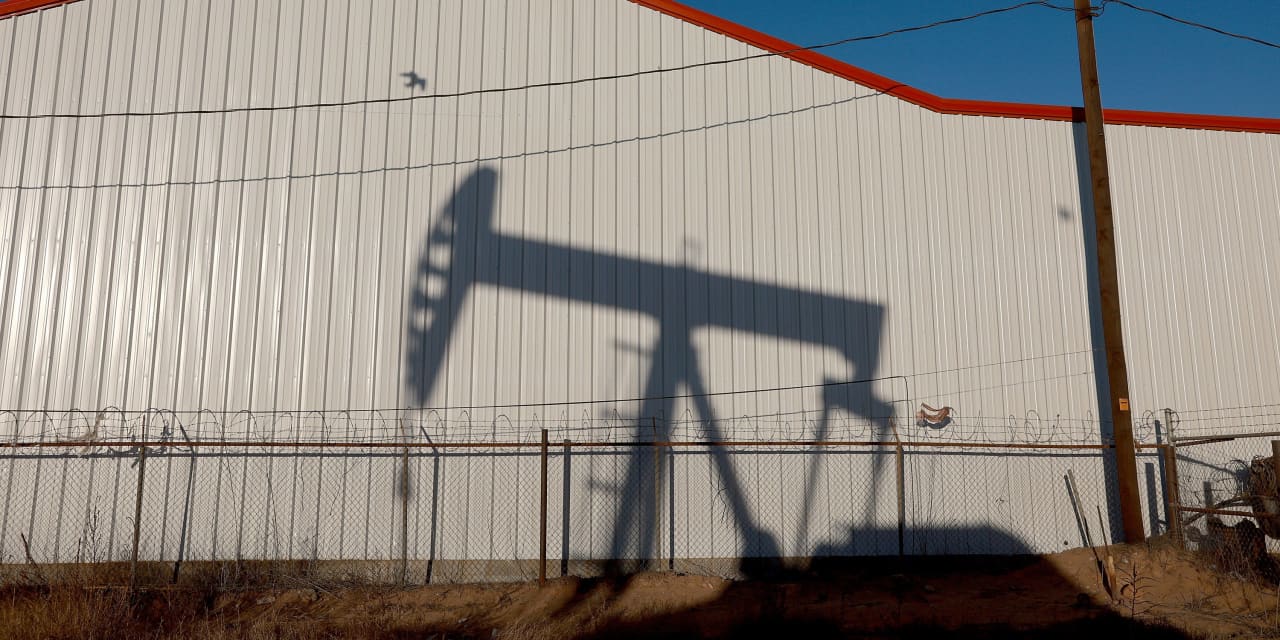Oil futures climbed Tuesday, with U.S. prices settling at their highest level in more than a week.
Prices got a boost from expectations for stronger energy demand from China and signs of tighter global supplies, as traders assessed prospects for a cease-fire between Israel and Hamas.
Price moves
-
West Texas Intermediate crude
CL00,
-0.10%
for April delivery
CL.1,
-0.10% CLJ24,
-0.10%
rose $1.29, or 1.7%, to settle at $78.87 a barrel on the New York Mercantile Exchange. That was the highest front-month contract finish since Feb. 16, according to Dow Jones Market Data. -
Front-month April Brent
BRNJ24,
-0.02% ,
the global benchmark, added $1.12, or 1.4%, at $83.65 a barrel on ICE Futures Europe. May Brent crude
BRN00,
-0.21% BRNK24,
-0.21% ,
the most active contract, climbed 99 cents, or 1.2%, to settle at $82.66 a barrel. -
March gasoline
RBH24,
-0.83%
tacked on 1.7% to $2.34 a gallon, while March heating oil
HOH24,
-0.97%
edged down by 0.6% to $2.75 a gallon. -
Natural gas for March delivery
NGH24
settled at $1.62 per million British thermal units, down almost 2.7% on the contract’s expiration day. April natural gas
NGJ24,
+2.77% ,
the new front month, rose 3.7% to $1.81.
Market drivers
President Joe Biden said Monday that he hopes a cease-fire between Israel and Hamas could take effect by early next week, pausing hostilities and allowing for the release of remaining hostages.
“The reality is that Hamas is not saying that they’ve agreed to anything yet,” said Phil Flynn, senior market analyst at the Price Futures Group, in a daily note.
Hostilities have so far not crimped the flow of crude from the Middle East, though concerns over a wider conflict have provided some underlying support to prices and have triggered occasional bouts of volatility.
Read: War wasn’t enough to budge oil prices. Here’s what could spark a big move.
Meanwhile, backwardation in both Brent and WTI oil futures suggest there is a tightness of supply for oil around the globe, said Flynn. Backwardation refers to a situation in crude contract values where prices for oil for delivery in the near future are higher than those for later deliveries.
The squeeze in supply seems to be due to a “combination of the fact that we’re seeing better-than-expected demand out of China and India, as well as delays in Red Sea cargoes due to the attacks by the Houthi rebels,” Flynn said.
On top of that, reports that the G20 is saying that the chances of a soft landing in the global economy are looking more likely is raising demand prospects for oil and gas, he added.
“One of the reasons why oil prices were subdued was the market was betting that we were headed towards a global recession,” Flynn said. “If that does not happen … we see a situation where the supplies will tighten significantly in the next quarter.”
Colin Cieszynski, portfolio manager and chief market strategist at SIA Wealth Management, told MarketWatch that the recent support for oil prices has been coming from improving expectations for demand from China.
Since the Chinese government undertook stimulus measures and interest-rate cuts, China-sensitive markets including equities and crude oil have been improving, he said.
There “are suggestions that China has been buying crude cargoes at an accelerated pace since the mid-February holiday, while also increasing its term supplies from Saudi Arabia in March,” said Ewa Manthey and Warren Patterson, commodity strategists at ING, in a note.
“The increased purchase from the country could also be attributed to the advance buying made ahead of the maintenance work when refiners typically reduce imports,” they wrote.
Elsewhere, news reports said Russian Prime Minister Mikhail Mishustin approved a six-month ban on gasoline exports beginning March 1.
The ban is probably due to refinery outages in Russia, said Barbara Lambrecht, commodity strategist at Commerzbank, in a note.
However, Russian gasoline exports are low, she added, which means the ban is unlikely to significantly affect supply on the global market. As for the European market, imports of Russian petroleum products have already been sanctioned for around a year with a few exceptions, Lambrecht noted.
Read the full article here




